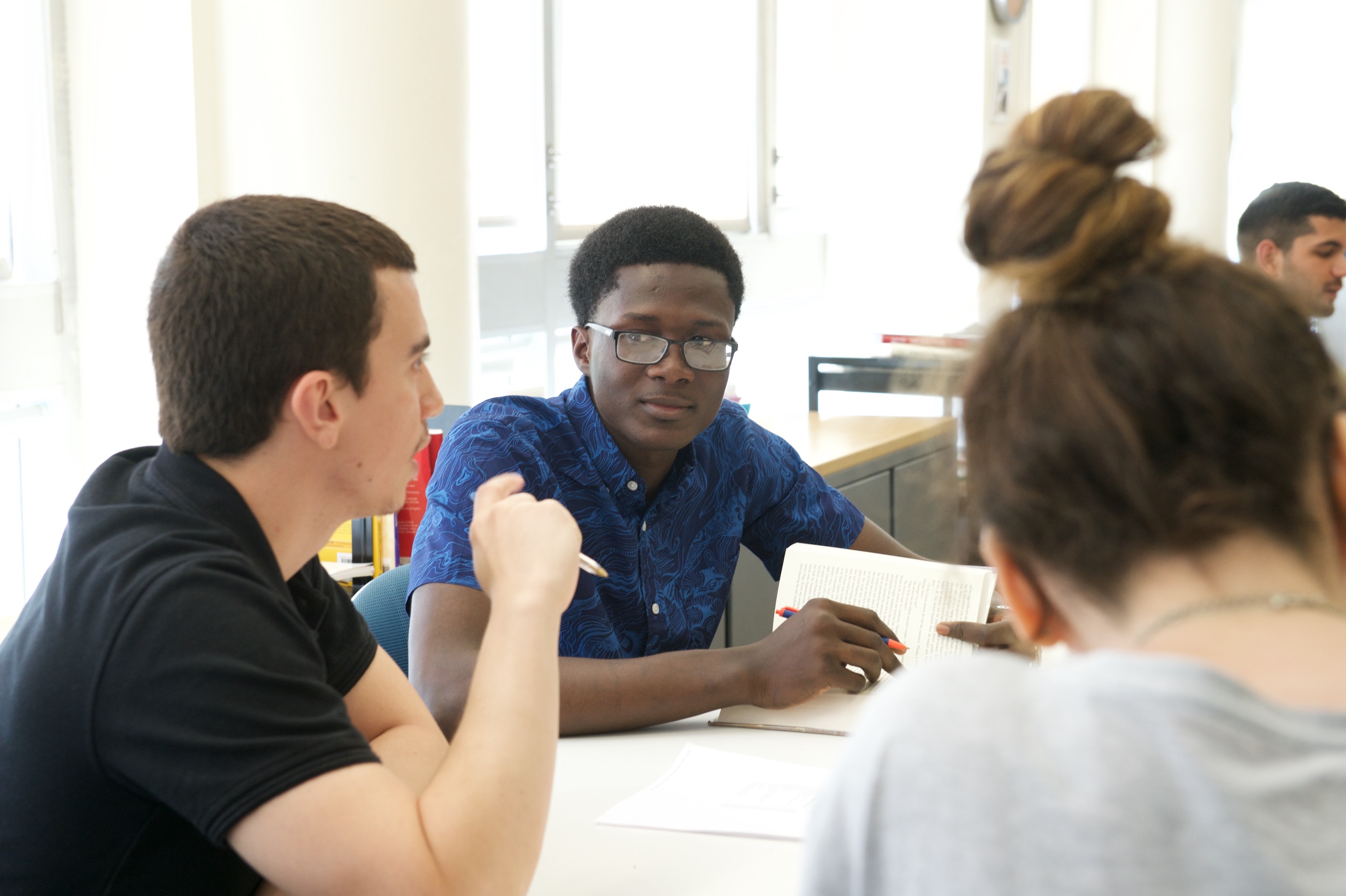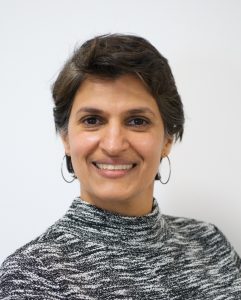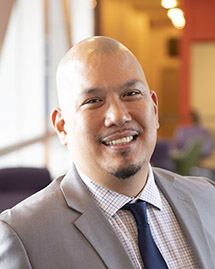
January 18, 2022
Projects supported through the President’s Fund for Excellence and Innovation at Borough of Manhattan Community College (BMCC/CUNY) share a commitment to student success in all its forms, enhancing their socioeconomic mobility through the transformative power of education.
 President’s Fund projects also reflect the vision of donor MacKenzie Scott, whose groundbreaking contribution to BMCC in Fall 2021 was earmarked to support underrepresented students from their basic needs to their career and higher education aspirations.
President’s Fund projects also reflect the vision of donor MacKenzie Scott, whose groundbreaking contribution to BMCC in Fall 2021 was earmarked to support underrepresented students from their basic needs to their career and higher education aspirations.
Gaining Academic Insight and New Strategies (GAINS) is a President’s Fund pilot program that contributes to this vision by helping students who are on academic notice for the first time, reconnect with their strengths, grow in the areas that need support and regain their good standing at the college.
GAINS was proposed by BMCC Counseling Center Director Neda Hajizadeh and Assistant Director of Outreach and GAINS Program Manager Robert Cortes, and is supported by the Academic Advisement and Transfer Center and the Learning Resource Center. The program builds on BMCC’s successful cohort model and provides dedicated success advocates, faculty mentors who help students create a personalized GAINS plan based on the Learning and Study Strategies Inventory (LASSI) and connect with campus-wide resources.
Being part of a cohort increases a student’s sense of belonging in college

“The idea behind GAINS was to create a cohort program for students on first-time academic notice and give them all-encompassing support in order to succeed and regain good academic standing,” says Neda Hajizadeh, Director of the BMCC Counseling Center.
The program’s approach, she explains, responds to the academic struggles that a student who is on first-time academic notice has, in a way that validates their strengths, builds their self-advocacy, agency and sense of responsibility for their own success.
Assistant Director Robert Cortes adds that the cohort model of the GAINS pilot program aligns with the BMCC strategic plan.

“The cohort experience supports students socially and personally, and in doing so, supports our strategic goal of strengthening our culture of care and creating an increased sense of belonging for students,” he says. “This leads to more motivation and confidence in overcoming academic and life challenges. Oftentimes, if students feel connected to their institution and to each other, they develop a higher sense of self-efficacy.”
Also, he says, students in peer groups can share problem-solving and study strategies, as well as report to each other about helpful resources.
“Research has shown that if you have a strong sense of belonging to your academic institution, the likelihood of you succeeding academically is higher,” says Director Hajizadeh. “We want to show a student who is struggling academically that they are not the only student struggling academically.”
Dedicated success advocates provide a vital point of connection for students
Students placed on academic notice for the first time and connected with the GAINS program are first matched with a dedicated member of the GAINS team referred to as an Academic Success Advocate (ASA).
The ASA helps them create an individual plan based on the Learning and Study Strategies Inventory (LASSI) inventory that they complete, in order to identify their strengths and areas they want to build on.
“This person also will be the touch point throughout the semester, to make sure that they’re working on the goals that they have created for themselves based on the results of the LASSI,” says Director Hajizadeh, “and that they are aware of free resources at BMCC that are both virtual and in person. These include tutoring for all subjects as well as coaching around study skills, housing and food assistance, legal services and more.”
GAINS increases access to resources through in-person and virtual communities
“The GAINS team is working on our online presence and have created an Open Lab GAINS Scholars community where students can learn more about the initiative,” says Director Hajizadeh.
That online community and other Student Affairs platforms provide options for students to gain a better understanding of their academic standing, tap into resources at the college, as well as stay in touch with peers in their GAINS cohort — all of which supports student retention in the program.
“In the Spring 2022 pilot program, we hope to recruit 80 to 100 students,” says Director Hajizedah. “As we strengthen and hone the program, we will open it up to more students in the coming semesters. Our goal is to eventually support allstudents who are on academic notice for the first time at BMCC.”
In addition to creating a personalized GAINS plan based on the student’s LASSI results, and connecting with an ASA, participants will take part in monthly events that blend learning opportunities with social activities, and are offered in a live and virtual hybrid model.
Each student’s progress will be carefully monitored and a mid-semester Academic Progress Review will identify additional areas of support that might be warranted.
At the end of the semester, students who have successfully restored their good academic standing will be honored in a ceremony and encouraged to join another cohort program at BMCC, so they continue to receive academic encouragement, access to learning resources and the support of a peer group of like-minded scholars.
Academic identity is about more than academics
“Overall, we’re helping students strengthen their academic identity,” says Director Hajizedah. “Building academic skills is only one facet of what needs to happen, for students to claim their success in college.”
She explains that students who are struggling in class, often experience struggles in other areas of their lives.
“As counselors in an academic setting, we have an idea of what struggles students have, but in this pilot program, we hope to expand that understanding beyond their classroom experience,” she says. “We will start by giving students the opportunity to tell us what has been going on with them.”
“We know that students who are struggling academically have struggles elsewhere in their life,” says Director Hajizadeh. “Is it financial? Is it work related? Is it related to mental health, or family? If the struggle is solely academic, we can go deeper, for example, into issues related to cognition. Altogether, this gives us a holistic understanding of the student and enables us to provide appropriate resources.”
“Issues affecting students’ academic performance could be anything from balancing work and family obligations, to the social injustices they might have to deal with every day in their communities — whether it’s due to racism, medical issues related to COVID, the criminal justice system, and other issues impacting our city,” says Assistant Director Cortes. “These are all things that can’t be separated from our students’ academic identities.”
Another challenge students face is having to navigate college in our remote world, he says, “learning new technology and platforms, learning to connect socially from behind a screen. These are all potential barriers to learning.”
Cultural and educational trauma are part of the conversation, when considering academic interventions
“When we say ‘support,’ we’re trying to look at it a little differently, through a growth mindset,” says Director Hajizadeh. “We all know that every individual has strengths. But when you end up on academic notice, the first thing people focus on, is what went wrong — what you didn’t do well.”
To shift the conversation back to student strengths, she says, “The GAINS team will emphasize to students that just because they’re not doing well academically, doesn’t mean they’re not doing well in other areas of their lives, as well. So let’s bring that up. Let’s lift them up and remind them of their strengths and all the beautiful qualities they have — and additionally help them reach out for the appropriate help they need to continue on a successful path academically.”
Assistant Director Cortes gives an example. “A student might work at a distribution warehouse 12 hours a day and have organizational skills that make them very successful in that environment — but they’re not connecting those skills to their academic career.”
“The first step is to help them see that,” he says. “The second step is helping them build self-confidence by connecting them with other students, where they share successes.”
In other words, says Director Hajizadeh, “Every individual comes with a story before they enroll at BMCC.”
She explains that some students have already experienced educational trauma by the time they arrive at BMCC.
“They’ve gone through the educational system and things haven’t gone the way they wanted,” she says. “Other students come in with traumatic experiences outside of education, that are part of our culture. There’s racial trauma, personal trauma — so I think we need to be more informed about all of these experiences, when we look for an academic intervention.”
Bottom line, she says, “We need to look at the person as a whole. We can’t assume that a student is just struggling in math. We need to look at the bigger picture; who that student is and experiences they’ve had that brought them to this point. Through that process, we will be able to provide the right tools to help them succeed.”
The GAINS program is aligned with the following BMCC Strategic Goals: #2: Improve learning and engagement in the first year (through a cohort experience); #4: Improve completion and transfer rates through integrated support services and #5: Strengthen our culture of care for students, faculty and staff.
STORY HIGHLIGHTS
- Gaining Academic Insight and New Strategies (GAINS), helps students who are on academic notice for the first time, reconnect with their strengths and grow where they need support
- GAINS is supported through the President’s Fund for Excellence and Innovation
- It was proposed by the Counseling Center and is supported by the Academic Advisement and Transfer Center and the Learning Resource Center

